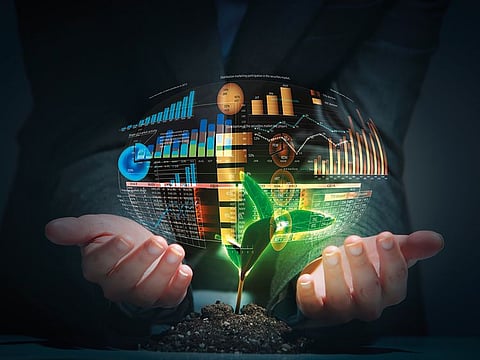For energy industry, the drive to Net Zero will be no easy run
How smooth the transition will be depends on changes done in years past

We have pledged one of the biggest steps in the history of our organization – to be Net Zero in 10 years. For any company, this is a huge goal. It is a tremendously ambitious target - we are a fossil fuel company in a country that is the third biggest member of OPEC, and based in the world’s epicenter of fossil fuel production.
We believe the energy industry lies at the core of making Net Zero in the UAE and worldwide by 2050 possible – and proactively playing our role is non-negotiable. We are determined to make the next decades count as we strive to support the three Ps – people, planet, profit – while supporting energy security, a cornerstone of modern-day civilization.
The Middle East is warming at twice the rate of the global average, according to the Max Planck Institute for Chemistry, as well as one of the greatest risks of running out of water worldwide. The impact of global strains will also reverberate across the Middle East. For one, the number of climate-related disasters worldwide has surged five-fold in the last five decades, according to the World Meteorological Organization (WMO).
Fossil fuels 2.0
For more than 150 years, the oil and gas industry has created innovation after innovation to propel massive growth, making it essential to every part of daily life and business. The industry has ventured into uncharted - and difficult - territory to explore and produce fossil fuels, often calling upon the ingenuity of its hearts and minds to succeed. And the industry has nurtured cross-border partnerships, often insulated from turbulent geopolitics, finding common ground and establishing best standards, especially in health and safety and technology advancements.
Against this backdrop lies a rallying cry for the industry to pivot, using these decades of experience in troubleshooting to tackle the challenges of Net Zero, efficiently and effectively. We are already seeing the positive power of this transition in the UAE; the first nation in MENA to announce a Net Zero target, by 2050 when others eyed 2060 and 2070.
The UAE and the world’s other energy giants will have a global stage to share how they can help achieve one of the trickiest balancing acts – achieve Net Zero without jeopardizing energy security – at COP28 in Dubai in November 2023. The world’s biggest annual climate gathering, located approximately one hour from our headquarters, must move the needle later this year.
Hitting the accelerator
We have an exceptionally busy decade ahead. Our plans including establishing a carbon capture and storage (CCS) business by 2025 and building solar power generation facilities to replace our energy consumption by 2032. We will also sponsor research on energy storage and green hydrogen at the American University of Sharjah and the University of Sharjah, supporting the UAE’s goal to capture 25 per cent of the world’s low-carbon hydrogen market by 2030.
Plans to convert our fleet of company vehicles into electric vehicles (EVs) are underway too, among many other endeavors.
No discounting of hurdles
The road ahead will bring challenges, but we have some practice. We have been making environmental strides for decades. For one, nearly all our methane emissions – the second largest man-made cause of climate change after carbon dioxide emissions – have been abated since 2000.
This is important considering the oil and gas industry are the number one cause of global methane emissions, which can be 28 times more potent on a 100-year timescale than CO2. We have implemented a zero-operational-flare policy over 20 years ago.
Even during operational upsets, we prioritize ‘no flaring’ over production. We also have an ongoing program to identify and mitigate all leaks in the flare system. Tackling flaring is key to enhancing energy efficiency; the natural gas flared worldwide in 2021 was equivalent to the total volume of natural gas imported into Germany, France, and the Netherlands, according to the International Energy Agency (IEA).
Another environmental campaign of ours from 1998-2003 included shutting down redundant equipment to reduce fuel gas consumption. Meters were also installed on all flares to monitor volumes and a robust greenhouse gas (GHG) measurement and accounting system was established – one that is still in use today.
We have also converted 15 per cent of power consumption at our LPG and condensate export terminals into solar power, and launched an ongoing education campaign called ‘Net Zero in SNOC and Beyond’ in 2022. It is targeted towards our employees, their families, university students, and the community at large – energy guardians of the future.
We wholeheartedly believe that the dedication and creativity of our hearts and minds will make our journey to Net Zero possible in less than 10 years. We look forward to bringing you along with us on our extraordinary journey.




